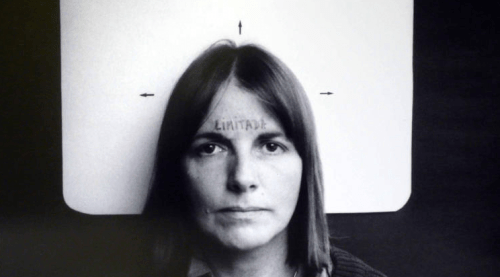
Marie Orensanz, Limitada, Ed. of 5, 1978/2018. Gelatin Silver Photograph, 16 x 20 in.
Radical Women: Latin American Art, 1960–1985
Exhibition and digital archive that presents the work of 120 women artists and collectives active in Latin America and the United States during a key period in Latin American history and the development of contemporary artRadical Women: Latin American Art, 1960–1985 presents the work of 120 women artists and collectives active in Latin America and the United States during a key period in Latin American history and the development of contemporary art. The artists represent fifteen countries and include emblematic figures such as Lygia Clark, Ana Mendieta, and Marta Minujín as well as lesser-known contemporaries such as the Cuban-born abstract artist Zilia Sánchez, the Colombian sculptor Feliza Bursztyn, and the Brazilian video artist Letícia Parente. The exhibition is the first survey of radical and feminist art practices in Latin America and among Latina artists in the United States.
For women artists in Latin America, the decades covered by the exhibition were a time of both repression and liberation. Most countries in the region were ruled by dictatorships or riven by civil war at some point during these years. The lives of many of the artists featured in Radical Women were thus enmeshed in experiences of authoritarianism, imprisonment, exile, torture, violence, and censorship. Yet this period also saw the emergence of new sensibilities. While few Latin American women artists identified as feminists, their works and their lives often manifested a vision of the female universe at odds with the region's repressive regimes and deeply rooted patriarchal values. The Latina and Chicana artists working in the United States developed an aesthetic that addressed the marginalization of women and of their own communities in American society. Many of them participated in the civil rights, antiwar, gay rights, and feminist movements. Whether based in Latin America or the United States, the artists embraced the expanded possibilities of the era, with some contributing to the revitalization of traditional mediums such as painting and sculpture and others taking up new disciplines such as video art, performance, and conceptual practices.
Central to the diverse works in Radical Women is the notion of the political body. The themes around which the exhibition is organized—the self-portrait, the relationship between the body and landscape, the mapping of the body, the erotic, the power of words, the performative body, resistance and fear, feminisms, and social places—serve to render visible the shared concerns of artists across a vast geographic region.
Curators
Cecilia Fajardo-Hill
Andrea Giunta
Venues
Hammer Museum
Los Angeles, CA
SEP 15–DEC 31, 2017
Brooklyn Museum
Brooklyn, NY
APR 13–JUL 22, 2018
Pinacoteca de São Paulo
São Paulo, BRA
AUG 18–NOV 19, 2018
Additional news articles: